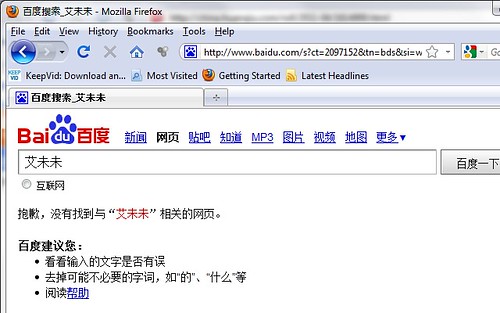Tax evasion has been used applied to prosecute another top artist, though largely domestic fame, actress Liu Xiaoqing, whose nonconformist images had made many people uncomfortable. In the 1980s, she largely left film industry and became a very successful businesswoman and later on, she was accused of tax evasion and was put into prison, before the auditing had been concluded. While she languished in prison (2002-2003, totally 422 days), her business and real estate properties were auctioned off at far below market value and it turned out later that the determined amount she owned to the state was less than value of one of her many houses. However, some resources put the amount much higher. After her release from the prison, she went back to business and acting and once again, established herself on stage, movie and television. Her case was a curious one, because many people, even artists, had been accused of tax evasion and none received punishment as severe.
If the rumor that Ai Weiwei will be accused of tax evasion, we can only hope that the trial would be a public and fair.
However, it is difficult to believe that was the real motive behind his disappearance. New York Times profiled him after his detention "An Artist Takes Role of China’s Conscience", detailing how he might have generated displeasure in certain powerful sector:
In a 30-year career he has combined, often at calculated personal risk, both aspects of his persona to create a role as an outspoken critic of the Chinese government, delivering his most stinging rebukes from within China itself. In light of his detainment, however, his ability to sustain this role, in China at least, would seem to be in serious doubt.Ai is a brave man for sure. However, there is another reason he could have been able to push so far, that is his famous father, Ai Qing (1910-1996), a poet with status similar to Walt Whitman or Alan Ginsberg.
From a Western perspective, Mr. Ai’s career fits a familiar profile. We tend to like our contemporary Chinese artists to come across as aesthetic tradition-busters. (This is one reason that Pop-style Mao paintings by the likes of Wang Guangyi remain big-selling auction items.) In this regard Mr. Ai has not disappointed. In the 1990s he painted Coca-Cola logos on ancient Chinese pots, broke up classical Chinese furniture and photographed himself making a single-digit rude gesture in front of the White House, the Eiffel Tower and Tiananmen Square.
But gradually such Duchampian moves have given way to large-scale, socially critical projects. For a conceptual piece called “Fairytale” at the 2007 Documenta in Kassel, Germany, he placed 1,001 antique Chinese chairs, available for use, throughout the exhibition. He built an outdoor structure from 1,001 doors salvaged from Ming and Qing houses that had been eliminated by rampant development in Chinese cities. Through the Internet he recruited 1,001 Chinese citizen-volunteers to come to Kassel to live for the duration of the show.
In short, he brought a sense of China that was at once inviting, puzzling and pathetic. The chairs were nice to sit in. It was hard to know what to make of the mini-army of temporary residents, who seemed equally uncertain of why they were there. The structure built from old doors finally just collapsed. Over all, “Fairytale” was not a winning picture of his homeland.
Incidentally, Ai Qing started as a painter. When he was imprisoned by Nationalist government, he took up writing and became a famous poet.
Now, the great opponent of Nationalist government, the Communist China, is detaining Ai Weiwei and perhaps, we are witnessing another great poet in the making?
By the way, Chinese Communist Party newspaper People's Daily had cited an article from Global Times (Chinese Communist Party's overseas propaganda outlet) speculating on why Ai's detained. However, when I tried to find the article on Global Times (Chinese edition) myself, the search result, via Baidu (the largest search engine in China), there was no search result for the term of "艾未未" (Ai Weiwei):

Related articles:
80 Days Later - Ai Weiwei Released on Bail
Where Is Ai Weiwei
48 Days Later - Ai Weiwei's Wife's Company Was Charged
A Mother's Wish: Ai Weiwei's Mother Looking for Her Son





No comments:
Post a Comment